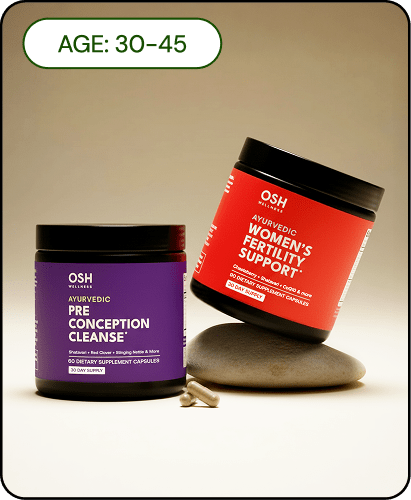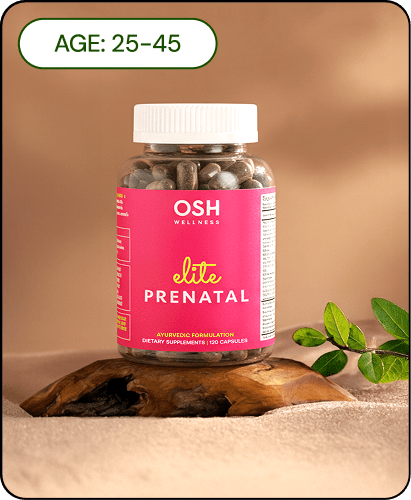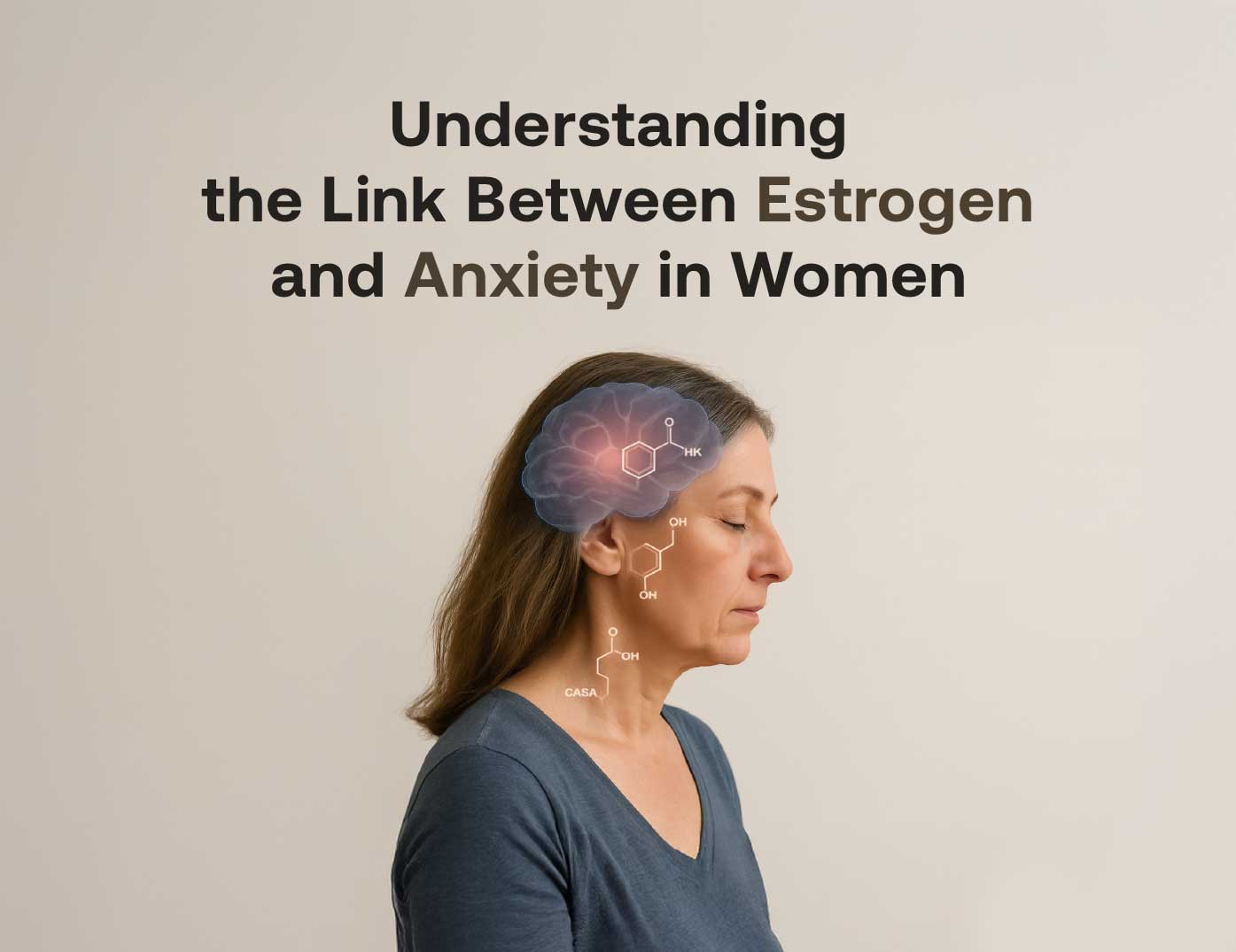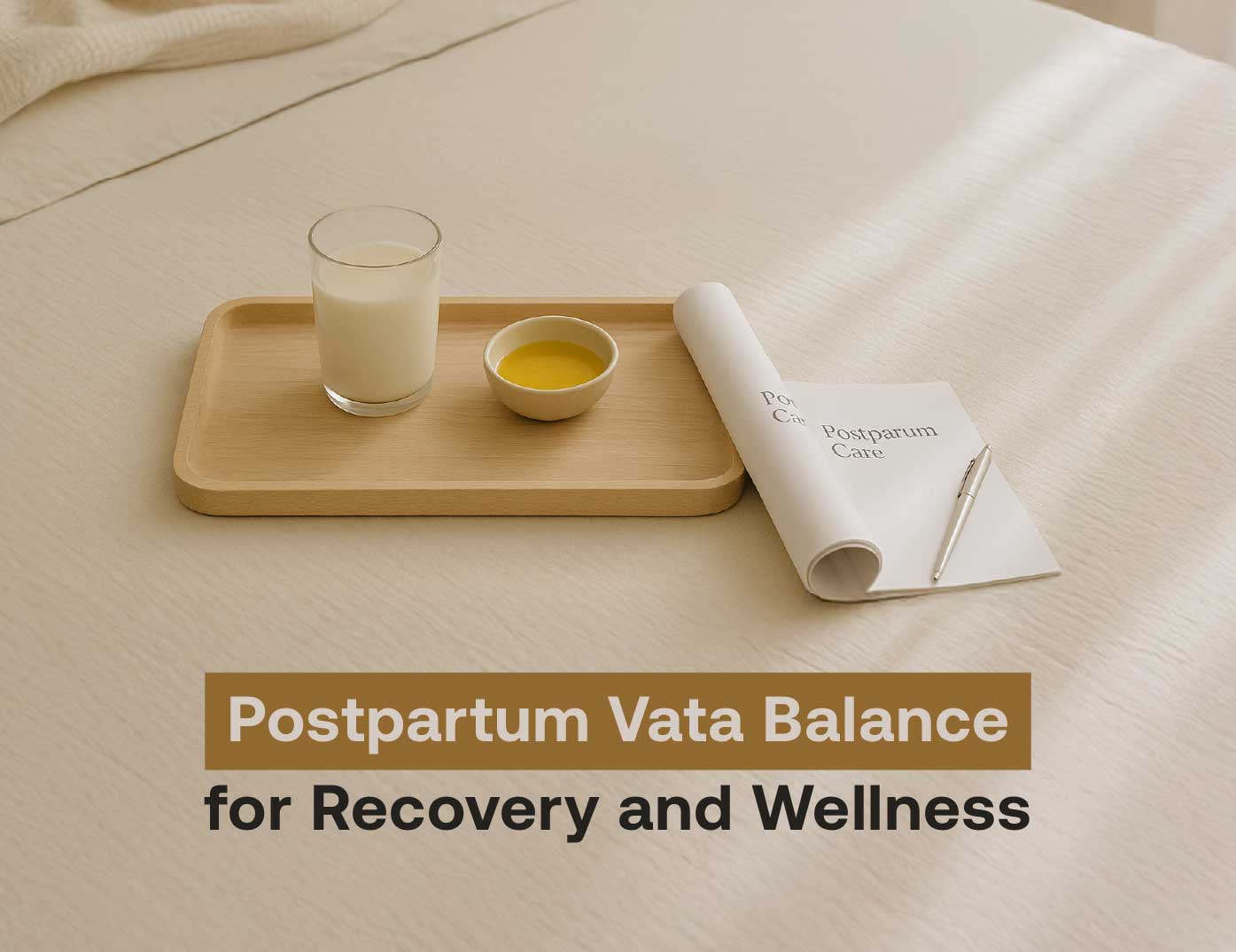Table of contents
Anxiety is a common experience for many women, particularly as they navigate hormonal fluctuations in midlife. This article delves into the intricate relationship between estrogen levels and anxiety regulation, shedding light on how hormonal changes can influence emotional health. By understanding estrogen's role in modulating neurotransmitters and brain function, especially for women aged 40+ experiencing perimenopause or menopause, we can uncover the underlying reasons for anxiety and explore effective coping strategies.
Introduction to Hormonal Anxiety

The interplay between hormonal changes and anxiety in women, particularly during midlife transitions such as perimenopause and menopause, is a critical area of study. As women undergo these physiological shifts, fluctuations in estrogen and progesterone have a significant impact on their emotional well-being. During perimenopause, many women report not only hormonal imbalances but also increased anxiety symptoms, such as irritability, tension, and unexplained fear. These emotional responses result from the interaction of these hormones with neurotransmitter systems in the brain, particularly serotonin and dopamine, which regulate mood [1].
Physical symptoms associated with menopause, such as hot flashes and disrupted sleep, can further worsen emotional challenges, making routine functioning more difficult. Studies suggest nearly 40% of women experience mood changes reminiscent of PMS during this time [2]. Moreover, women with pre-existing anxiety disorders may find symptoms worsening, reinforcing the need for tailored clinical support [3].
Understanding the influence of hormonal fluctuations on anxiety is essential, not only for improving individual mental health but also for guiding the development of effective, personalized interventions for women navigating these pivotal life stages.
The Biochemistry of Estrogen and Mental Health

Let's examine the historical and emerging scientific understanding of estrogen’s role in emotional regulation. We will delve into how estrogen biochemically interacts with brain systems influencing mood, and spotlight how hormonal imbalances can intensify various anxiety disorders in women facing significant hormonal changes.
Estrogen modulation of key neurotransmitters, such as serotonin, dopamine, and GABA, has profound implications for mental health. Its levels tend to fluctuate significantly during reproductive milestones like menstruation, postpartum recovery, and menopause, all of which are periods associated with increased susceptibility to anxiety and depression [4].
Estrogen positively influences serotonin availability by enhancing synthesis, promoting receptor expression, and restricting reuptake. It also affects the dopaminergic system, which governs motivation and reward signaling [5]. Additionally, it plays a role in regulating GABA transmission, which is crucial for mood stabilization and reducing anxiety. Its interactions with the glutamate system further establish its extensive influence over emotional response [6].
Periods of high estrogen, such as around ovulation or during pregnancy, often result in enhanced emotional regulation. Conversely, declining or fluctuating estrogen levels amplify stress sensitivity and heighten the risk of mood disorders like PMDD and anxiety [7]. Thus, the biochemical impact of estrogen on mood and anxiety underscores its central role in women's mental health throughout life [8].
Estrogen and Neurotransmitter Systems

Estrogen plays a critical role in regulating neurotransmitter systems vital for emotional balance in women. It specifically affects serotonin, dopamine, GABA, and glutamate, all of which are closely tied to anxiety and mood stability.
Key ways estrogen influences neurotransmitter pathways include:
Enhancing serotonin synthesis via tryptophan hydroxylase activity.
Reducing serotonin breakdown and reuptake, increasing its presence in the synaptic cleft [7].
Regulating dopamine levels and supporting receptor activity in the prefrontal cortex, improving cognitive and emotional regulation [9].
Modulating GABA transmission, though findings here are mixed, as both excitatory and inhibitory effects have been observed depending on the hormonal context [10].
Augmenting glutamate release and maintaining excitatory synaptic signaling, essential for mood balance [5].
These mechanisms collectively explain how estrogen contributes to mood stability. Its absence or dysregulation often corresponds with heightened anxiety symptoms, particularly during hormonal transitions such as menopause and the postpartum period [8].
The Impact of Menstrual and Life Cycle Variations

Hormonal changes across the menstrual cycle, postpartum period, perimenopause, and menopause significantly influence women's mental health. Here's how:
Menstrual Cycle: During the follicular phase, increased estrogen improves mood, but during the luteal phase, rising progesterone can heighten amygdala activity, making women more prone to anxiety, especially those with pre-existing conditions [11].
Postpartum: The sudden drop in estrogen and progesterone after childbirth, combined with maternal stress, leaves many women at risk for postpartum anxiety and depression [12].
Perimenopause: This phase is marked by fluctuating estrogen levels. Coupled with life stressors, women often face increased anxieties, aggravated premenstrual symptoms, and panic-like feelings [13].
Menopause: A marked decline in estrogen and progesterone levels occurs, accompanied by neurobiological and psychosocial changes that can deepen anxiety or depressive states [14].
Research Findings on Estrogen and Anxiety

Recent research underscores a robust relationship between estrogen levels and anxiety symptoms. Observational and clinical studies indicate that reduced estrogen correlates with elevated anxiety, particularly during premenstrual or postmenopausal phases.
Harvard researchers observed that higher estrogen may protect against emotional disturbances in high-stress or trauma-involving environments [4]. Another study published in JAMA Psychiatry revealed that withdrawing estradiol led to increased anxiety in women with a history of premenstrual depression, while continued treatment helped them remain symptom-free [15].
Further studies affirm that individualized responses to estrogen can influence the success of hormone therapy. Women more sensitive to hormonal fluctuations, particularly estradiol, benefit most from treatment, highlighting the need for personalized hormonal care [16]. Meanwhile, both low and excessively high estrogen levels have been linked to mood disturbances through mechanisms involving neuroinflammation and inhibitory pathways [7].
Coping Strategies and Hormonal Health

Managing anxiety linked to hormonal changes requires a multi-dimensional approach. Effective strategies include:
Tracking symptoms: Keeping a hormone-symptom diary can help identify anxiety triggers related to hormonal shifts [17] .
Diet: Focus on whole grains, lean protein, and fibrous vegetables. Reduce caffeine and alcohol intake to support balanced hormone function [18] .
Physical Activity: Aerobic exercise and yoga can help regulate hormones and mitigate anxiety-induced stress responses [19] .
Sleep hygiene: Consistent, high-quality rest is essential for hormonal and emotional balance.
Hormone Replacement Therapy (HRT): HRT can reduce menopausal symptoms and improve mood, but should be evaluated carefully for risks like blood clots and stroke [20] .
Integrating these strategies builds a solid foundation for emotional stability, especially during times of hormonal transition.
Relevant Products
To help manage mood and support hormonal health, Osh Wellness offers a targeted range of natural supplements. These products aim to enhance emotional well-being and provide a complementary approach to lifestyle strategies for managing anxiety during hormonal changes.
Conclusions

The connection between estrogen and anxiety is both complex and crucial. Hormonal evolution throughout a woman's life, from the menstrual cycle to menopause, significantly impacts emotional health. By recognizing these influences, women can implement proactive strategies for mood management , seek appropriate interventions like HRT where applicable, and ultimately take charge of their mental health journey.
FAQs
What role do hormones play in anxiety?
Hormones like estrogen and progesterone regulate neurotransmitters that influence mood and anxiety levels.
How can lifestyle changes influence hormonal balance?
Diet, exercise, and sleep help maintain hormonal equilibrium and support emotional health.
Are there natural remedies for anxiety linked to hormonal changes?
Yes. Techniques include yoga, diet modifications, and plant-based supplements like Osh Hormone & Mood Support.
What are the risks associated with hormone replacement therapy?
Potential risks include stroke, blood clots, and some cancers, depending on the regimen.
How can women in their 40s manage anxiety related to menopause?
Lifestyle adjustments, symptom tracking, and medical support such as HRT can be effective.
Sources
1: Johns Hopkins Medicine - Perimenopause and Anxiety
2: Evernow - Managing Anxiety, Depression, and Mood Swings During Perimenopause
3: ACOG - Mood Changes During Perimenopause
4: Harvard University - Estrogen and Female Anxiety
5: PMC - Estrogen and Neurotransmission
6: Aging-US - Hormonal Effects on Mental Health
7: PMC - Hormones and Mood Disorders
8: PMC - Hormonal Fluctuations and Neurotransmitter Systems
9: Frontiers in Public Health - Estrogen and GABA Systems
10: NIH - Menstrual Cycle and its Effect on Anxiety Symptoms
11: Trinity Health - Mental Health in Postpartum & Menopause
12: Riverwalk OBGYN - Hormones and Mood
13: Marion Gluck Clinic - Hormones and Anxiety
14: JAMA Psychiatry - Estradiol and Mood Disorders
15: PMC - Sensitivity to Estradiol and Anxiety Relief
16: Monarch Behavioral - Hormones and Anxiety Triggers
17: U.S. Women's Medical Center - Lifestyle Tips for HRT








